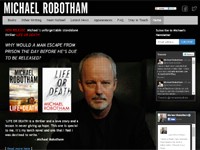-
Setup Your Website
How it Works
Test drive your fully functioning web site system for ten days before deciding whether to continue with your website (top level domain name and email not included in free trial). You have access to all tools and tutorial help. If you decide to go ahead we will organise your domain name and email addresses.
Click here to view the available website designs. - See Our Designs
- Example Sites
- Support / FAQ
- Do I need additional software to maintain my website?
- How do I upload and/or resize images and photos to my website?
- Do I need to know HTML or any other programming language to use C...
- How do I change my logo?
- How long will it take me to build a website?
- How do I set my website up?
- How long will it take to learn how to maintain my site?
- How do I view my website while it is a trial site?
- How do I edit the pages of my website?
MOST POPULAR

- My Account
MY ACCOUNT
MY EMAIL
ADDITIONAL INFORMATION
- Home
Basic Search Engine Optimisation for my website (SEO)
The definition of SEO from Wikipedia is:
“Search engine optimization (SEO) is the process of improving the volume and quality of traffic to a web site from search engines via "natural" ("organic" or "algorithmic") search results.”
In the past few years, nothing has been more commonly asked of a web developer than "How do I get my web site to the top of the search results in Google?" - if I had a dollar for every time I've heard that question....
At Chilli Websites we have spent many hours studying and discussing SEO over many years now and we are continuously researching the latest best practice techniques. One of the highest priorities at Chilli Websites is ensuring all of the web sites built using our system adhere to these best practice SEO techniques now and into the future.
Search Engine Optimisation is as much an art as it is a science - but the following paragraphs will explain the basic technical qualities your website should possess in order to be search engine friendly. All websites built using the Chilli Websites system do possess these characteristics and we also explain below how you can best utilise them on your web site.
On Page Characteristics
On Page Characteristics refer to characteristics of your actual website and include:Writing good content
– The most important aspect in SEO is the actual content of your web site. This refers to all text you have on your site. The more great content, interesting articles, FAQ’s, stories, etc. you have on your site the more people will want to read it and the higher your page will rank in the search engines. Remember - the more you write, the better your chance of being found by people searching for your products or services.When writing your content for each page, you need to consider all key phrases which a potential customer might type into a search engine in search of your products or services and fit these key phrases into your content. Then you will want to repeat these key phrases through your heading tags, page title, meta keywords and meta description tags.
** Application to Your Website - With Chilli Websites Content Management System (CMS) you have complete control over the content of every page of your website so can easily affect this element of SEO. Start writing and continue to revise and improve your content!
Keywords and Key Phrases on each page of your site
– make sure you are writing your specific keywords and more importantly key phrases throughout all the copy in your site. Most searches today are done using more than one word and so it is important that you consider what your potential customers may be typing into a search engine when they want to find your business. When writing your key phrases to your copy you should consider their density and relevance. Do not overuse phrases or keywords as this will be seen as "spamming" by the search engines and may count against you. Use different key phrases on the different pages of your web site.When considering your key phrases, it is often best to be specific and not try to optimise for highly competitive and/or general key phrases. For example if you are a real estate agency in the Western Suburbs of Sydney, it is better to optimise your page for "real estate Sydney western suburbs" than just for "real estate". The reasons for this are two fold - you don't necessarily want all of the internet traffic searching for real estate throughout the world and secondly there would be millions of web sites throughout the world trying to reach the top of search results for real estate while there will only be perhaps a few hundred wanting to reach the top for real estate in the Western Suburbs of Sydney.
** Application to Your Website - With Chilli Websites Content Management System (CMS) you have complete control over the content of every page of your website so can easily affect this element of SEO.
Page headings
– The page heading is the main heading on each page describing what the page is about. This should be relevant to the content on the page and also relate to the page title. Again using this page for an exampleyou see that the main title at the top of the page is "Basic Search Engine Optimisation for my website (SEO)". In a technical sense you should make sure your main heading is using an H1 tag.** Application to Your Website - When editting any page on your Chilli Websites site you can select your page heading (by running your cursor over the text while holding down the left button on your mouse). Then, with the text selected, click on the drop down box titled "Style" and select "Header 1". This applies the H1 tag and the relevant colour and font size to the text.
Page titles
– This is referring to the name of each web page. Page titles show up on the top of the internet browser window and should be relevant to the content on the page. Typically you would want to use a combination of your most relevant key phrases from the content of the page. For example, the page title of this page is “Basic search engine optimisation for my website SEO best practice techniques” (you can see this at the very top of your browser).** Application to Your Website - When editting any individual page on your Chilli Websites site you will see an area below the main page editor titled "Search Engine Optimisation". In this area, there is a field titled "Page Title" where you can enter your relevant page title for each page individually.
Meta Tags and Descriptions
– This refers to the tags that are inserted into the Header section of your website. There are two main meta tags – Keyword and Description. In the keyword meta tag you would insert all the key phrases relevant to the individual page. This includes words that prospective customers would type when using a search engine to find your website. Ensure that all your key phrases also appear at least once in the content of your page - otherwise you may be judged to be "spamming" by the search engines!The description meta tag is where you would enter a description of each page. This shows up in a search engine when someone searches for your site. Each page description should reflect the content on the page and use the key phrases from your copy. For example if you type Chilli Websites into Google you will see that the description “Northern Beaches Sydney Web site designers. Instant template sites easy to maintain with our user friendly content management system CMS.” shows up right underneath the link. That is the description we used in the description meta tag for our home page.
** Application to Your Website - When editting any individual page on your Chilli Websites site you will see an area below the main page editor titled "Search Engine Optimisation". In this area, there are fields titled "Page Description" and "Page Keywords " where you can enter your relevant description and keywords for each page individually.
Outbound Links
– This refers to all the links on your site and what text they include. If you need to link text to another page on your site you should write a descriptive link, not just “click here.” For example, "Click here for a Free Trial of Chilli Websites Content Management System".** Application to Your Website - With Chilli Websites Content Management System (CMS) you have complete control over the content of every page of your website so can easily affect this element of SEO when adding links to your website.
Image Names
– This refers to the “alt” text you give images when inserting them into your site. The Alt text is basically a description of the image. This helps make your website accessible for people who have disabilities. This text is also useful for search engines to categorise your images so that people may find them when conducting an image search (which may lead them to your web site!) Again you should use key phrases which are relevant to the content on your page. For example the puzzle piece image in the upper right of this page has an Alt tag of "Search Engine Optimisation for my website" - you can see this by hovering your cursor over the image.** Application to Your Website - With adding/changing an image using Chilli Websites CMS you can add the image's Alt tag in the field titled "Alternative Text" in the pop up window where you select the image to be displayed.
Off Page Characteristics
Off Page Characteristics include characteristics that are not on your actual website pages such as:Links from other websites that link to you
. When a search engine finds a link to your site from another site, it checks to see how relevant the link text is, the quality or page rank of the site that links to you and the keywords that are included in that site, and more.** Application to Your Website - You will need to approach owners of web sites relevant to your business and/or complimentary to your business who may agree to provide a link to your web site in exchange for a link from your web site to theirs - this is called "reciprocal links". Alternatively you may purchase links from other web sites such as a local industry directory or similar. Also, you can purchase advertising on other web sites (i.e. banner ads, etc).
The quality or page rank of the sites that you are linking out to and what the link text says, etc.
Further Reading on SEO
If you want to truly understand Search Engine Optimisation and Search Engine Marketing I suggest you read the entire Wikipedia article on Search Engine Optimisation.We encourage you to contact us with any questions or to take a FREE Trial of our Search Engine Optimised self managed web sites!
Chilli Websites can Search Engine Optimise your web site for you whether it is one of our web sites or on any other server. Contact us to discuss having us Search Engine Optimise your web site.

© 2025 Chilli Websites. All rights reserved.
How it Works
Test drive your fully functioning web site system for ten days before deciding whether to continue with your website (top level domain name and email not included in free trial). You have access to all tools and tutorial help. If you decide to go ahead we will organise your domain name and email addresses.
Click here to view the available website designs.
Try out a web site for your business for 10 days FREE!
It's easy - just choose from our professionally designed templates the site you think best reflects your business needs and try it out for 10 days free of charge and free of any commitment. All you need to do is register and your web site is instantly accessible and ready to add text, pictures, links and more.
You have ten days to "test drive" your site and perhaps ask for feedback from colleagues and friends. If after your ten day FREE TRIAL you would like to keep your web site simply pay the invoice that has been emailed to you and your site will be sent LIVE!
If it is Free, why do I choose how I want to pay?
We will send you an initial invoice once you setup your free trial. You are under no obligation to pay this invoice - if you choose to continue with the website simply pay the invoice and we will organise for your site to be live at your web address. If you choose not to continue beyond the free trial simply disregard the invoice and your website will automatically shut down after the ten day period.
THANKS, CLOSE THIS WINDOW



